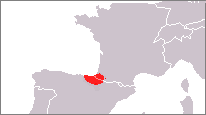Wikijunior:Languages/Basque
What writing system(s) does this language use?
[edit | edit source]The Basque language is written using the Latin alphabet, with the addition of the letter Ñ, which also occurs in Spanish, for 27 letters total. The letters C, Q, V, W and Y are not normally used in Basque - they are typically used for words Basque has borrowed from other languages.
You may also see the letters Ç and Ü in written Basque. These letters are variants of C and U.

variant — a form of something slightly different from the standard.
How many people speak this language?
[edit | edit source]Basque is the native language of around 750,000 people. of these, round 700,000 live in Spain, and the remaining 50,000 in France.

native language — first language that one has learned to speak as a child; the language of one's parents. Also known as one's mother tongue.
Where is this language spoken?
[edit | edit source]
Basque is spoken in the Basque Country, a region in Europe which sits in the Pyrenees Mountains, on the border between Spain and France. In the Spanish portion, Basque is one of the two official languages alongside Spanish, whilst in the French portion it has no official status.

official language — the language used by a local government.
What is the history of this language?
[edit | edit source]Basque is a very unique language because it is a language isolate! This means it is not related to any other living language in the world!

language isolate — A language not related to any other living language (a language with native speakers) in the world.
This is because Basque is a very old language. We do not know where exactly it came from, but it's believed that long ago, before any of the languages spoken today had arrived, Basque was part of a family of ancient languages spoken in western Europe. When the Roman arrived in the area in the second century BC, they began to assimilate the local peoples into Roman culture, making them abandon their local languages in favour of Latin. However, Roman rule in the Basque Country was not consolidated until much later, and so Basque was able to avoid this assimilation, but all of its living relatives were left extinct.

assimilate — absorb people or ideas into a society or culture.
Despite this, Basque did take in a large number of loanwords from its neighbouring languages - first from Latin, and then from French and Spanish. The voyages of Basque explorers in the 16th century spread the language overseas, where it influenced the local dialects of Spanish. Today, around 40% of Basque vocabulary consists of loanwords.

loanwords — words in a language that have been borrowed from other languages.
However, Basque was never an official language of medieval Spain or France, meaning it was difficult for Basque people to survive on just Basque as things like official documents or government announcements were not give in the language.
In 1939 a man named Francisco Franco took power in Spain, instituting in a dictatorship. Franco wanted to turn Spain into a country where only Spanish was spoken, and so he placed a ban on the Basque language, meaning people were legally forbidden from speaking it, and faced fines if they did. It was forbidden to teach Basque in schools, newborn babies could not be named with Basque names, and books could not be published in the Basque language. This caused the number of Basque speakers to decline.
The ban on Basque was lifted in 1968, seven years before Franco's death, and a standardised form of the language was created the same year. Measures were introduced to revive the Basque language and reverse the damage the ban inflicted, which have been successful so far.
Who are some famous authors or poets in this language?
[edit | edit source]Most Basque literature is fairly recent by historical standards - he earliest being dated from the 16th century. No Basque poets or authors have ever really achieved fame,
What are some basic words in this language that I can learn?
[edit | edit source]What is a simple song/poem/story that I can learn in this language?
[edit | edit source]References
[edit | edit source] |
Wikijunior:Languages | edit | |
|
Introduction •
Glossary •
Authors and Contributing •
Print Version
| |||